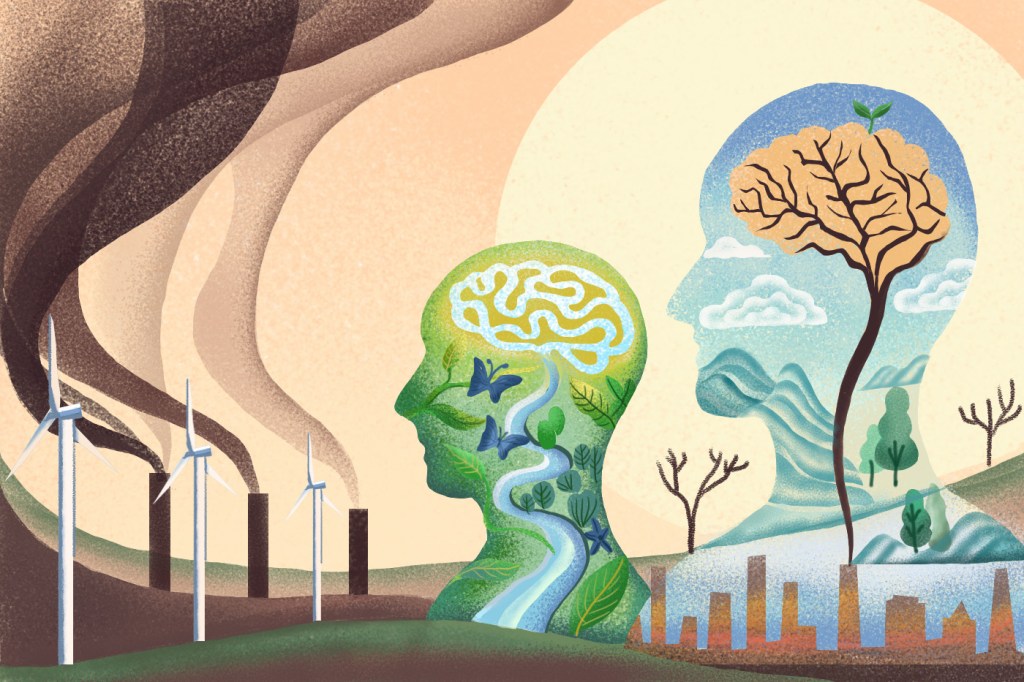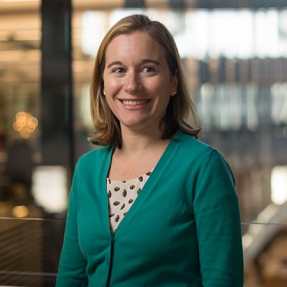We can’t combat climate change without changing minds. This psychology class explores how.
We can't combat climate change without changing minds. This psychology class explores how. Northeastern University


We can’t combat climate change without changing minds. This psychology class explores how.
PSYCH 4660: Humans & Nature is part of a broader academic push at Northeastern to explore the intersection of environmental science and cognitive processing — and how it can lead to tangible changes.
Introduction
Published on

The Psychology of Social-Ecological Systems
PSYCH 4660 Humans & Nature: The Psychology of Social-Ecological Systems is a seminar in cognition that explores how people encode, represent, and process information from the environment in the brain. The course focuses on how these cognitive processes inform our interactions with the natural world. It is part of a larger academic push at Northeastern University to examine the intersection of environmental science and cognitive processing and how it can lead to tangible changes.
The Human Behavior Side
Professor Brian Helmuth, a marine science professor, and Professor John Coley, a developmental psychologist, co-teach the course. Helmuth’s research focuses on how climate change impacts coastal ecosystems, while Coley’s research explores how personal experiences and backgrounds affect individuals’ understanding of the natural world. The central argument of the class is that our personal backgrounds, behaviors, and resulting worldviews may hold the key to saving the planet.
Different Attitudes
The class begins with detailed introductions from each student, highlighting their personal backgrounds, behaviors, and worldviews. These introductions emphasize the diversity of perspectives within the class and set the stage for discussions on how different attitudes towards sustainability and environmental issues can shape individual behaviors. The students discuss topics such as collectivism versus individualism and the influence of cultural norms on sustainable practices.
Further Examination
Helmuth and Coley believe that insights gained from studying the intersection of psychology and environmental science can have direct impacts on real-world scenarios. They are optimistic about the future possibilities of interdisciplinary collaborations and are launching a new Ph.D. program in Human Behavior and Sustainability Sciences at Northeastern University. This program aims to integrate psychology and environmental science to provide structured opportunities for students to make connections across fields and contribute to solving environmental challenges.
Schuyler Velasco is a Northeastern Global News Magazine senior writer. Email her at s.velasco@northeastern.edu. Follow her on X/Twitter @Sch
SDGs, Targets, and Indicators
1. Which SDGs are addressed or connected to the issues highlighted in the article?
- SDG 4: Quality Education
- SDG 12: Responsible Consumption and Production
- SDG 13: Climate Action
- SDG 15: Life on Land
2. What specific targets under those SDGs can be identified based on the article’s content?
- SDG 4.7: By 2030, ensure that all learners acquire the knowledge and skills needed to promote sustainable development, including among others through education for sustainable development and sustainable lifestyles.
- SDG 12.8: By 2030, ensure that people everywhere have the relevant information and awareness for sustainable development and lifestyles in harmony with nature.
- SDG 13.3: Improve education, awareness-raising, and human and institutional capacity on climate change mitigation, adaptation, impact reduction, and early warning.
- SDG 15.5: Take urgent and significant action to reduce the degradation of natural habitats, halt the loss of biodiversity, and protect and prevent the extinction of threatened species.
3. Are there any indicators mentioned or implied in the article that can be used to measure progress towards the identified targets?
- Indicator for SDG 4.7: Proportion of students who have achieved proficiency in knowledge and skills relevant to sustainable development.
- Indicator for SDG 12.8: Number of countries implementing sustainable consumption and production policies and action plans.
- Indicator for SDG 13.3: Number of countries that have integrated climate change education into their national curricula.
- Indicator for SDG 15.5: Extent of protected areas in relation to terrestrial areas.
SDGs, Targets, and Indicators Table
| SDGs | Targets | Indicators |
|---|---|---|
| SDG 4: Quality Education | 4.7: By 2030, ensure that all learners acquire the knowledge and skills needed to promote sustainable development, including among others through education for sustainable development and sustainable lifestyles. | Proportion of students who have achieved proficiency in knowledge and skills relevant to sustainable development. |
| SDG 12: Responsible Consumption and Production | 12.8: By 2030, ensure that people everywhere have the relevant information and awareness for sustainable development and lifestyles in harmony with nature. | Number of countries implementing sustainable consumption and production policies and action plans. |
| SDG 13: Climate Action | 13.3: Improve education, awareness-raising, and human and institutional capacity on climate change mitigation, adaptation, impact reduction, and early warning. | Number of countries that have integrated climate change education into their national curricula. |
| SDG 15: Life on Land | 15.5: Take urgent and significant action to reduce the degradation of natural habitats, halt the loss of biodiversity, and protect and prevent the extinction of threatened species. | Extent of protected areas in relation to terrestrial areas. |
Behold! This splendid article springs forth from the wellspring of knowledge, shaped by a wondrous proprietary AI technology that delved into a vast ocean of data, illuminating the path towards the Sustainable Development Goals. Remember that all rights are reserved by SDG Investors LLC, empowering us to champion progress together.
Source: news.northeastern.edu

Join us, as fellow seekers of change, on a transformative journey at https://sdgtalks.ai/welcome, where you can become a member and actively contribute to shaping a brighter future.








